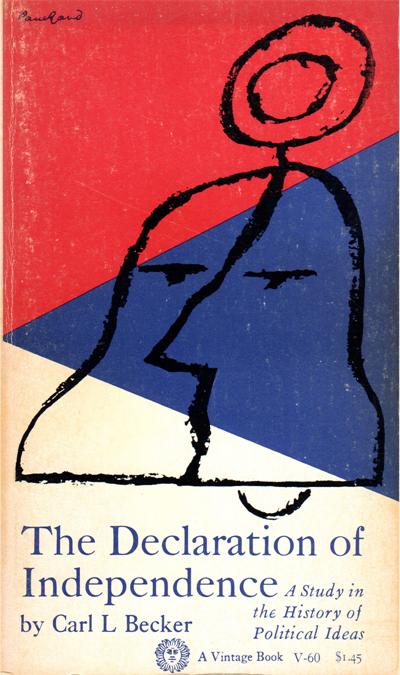 One of the books that has stuck with me over the years is Carl Becker’s The Declaration of Independence (1922, reprint 1942), not only for its incredibly clear and beautiful writing but also for its emphasis on the impact of the revolution most prominently caused by Isaac Newton, which was later subsumed under the term Scientific Revolution covering the entire 17th century. A consequence of this remarkable period was the so-called Enlightenment that followed in the 18th century and became the soil from which our nation’s founding ideas and documents sprang. Both these centuries have been further optimistically called the Age of Reason.
One of the books that has stuck with me over the years is Carl Becker’s The Declaration of Independence (1922, reprint 1942), not only for its incredibly clear and beautiful writing but also for its emphasis on the impact of the revolution most prominently caused by Isaac Newton, which was later subsumed under the term Scientific Revolution covering the entire 17th century. A consequence of this remarkable period was the so-called Enlightenment that followed in the 18th century and became the soil from which our nation’s founding ideas and documents sprang. Both these centuries have been further optimistically called the Age of Reason.
Our current times, awash in lies, corruption, and such terms as “alternative facts”, have been characterized as an assault on the rationalism and Enlightenment that shaped our founding. Any revisiting of these origins would seem to be a valuable endeavor to see if they still have validity. What makes Becker’s essay particularly relevant to me is the current pervasiveness of the mathematical view of reality that was launched by Newton some 300 years ago. Becker shows how this new way of thinking spread far beyond the bounds of mathematics and engendered a new “natural rights” philosophy that formed the foundation for the Declaration of Independence. Essentially the idea was that if the behavior of the natural world was based on (mathematical) laws, then so must the behavior of man be based on natural laws.
See Newton and Declaration of Independence
(Updates 10/31/2019, 9/18/2020, 3/9/2024) Steven Strogatz Confirmation, an Atlantic article, Natural Law
(Update 10/31/2019) Steven Strogatz Confirmation. I belatedly came across a Youtube video of Steven Strogatz’s 8 May 2019 ICERM talk, “What’s the big deal with calculus?” based on his newly published (April 2019) book Infinite Powers: How Calculus Reveals the Secrets of the Universe. The talk is a little over an hour, but well worth every minute. In particular, in the beginning when he was listing all the things that were dependent upon calculus, Strogatz included the Declaration of Independence and said he would address that at the end if anyone was interested. And so that was one of the questions asked at the end, which he answered briefly.
Apparently Strogatz discussed in his book, referencing I. Bernard Cohen’s 1995 book, Science and the Founding Fathers, that Jefferson was very enamored of Newton, as were all the thinkers of the Enlightenment. Cohen associated Jefferson’s reference to the Laws of Nature justifying the Declaration as referring to Newton’s Laws of Motion. Cohen also felt that Jefferson modeled his argument in the Declaration after the deductive principles of Euclidean proofs that again were very familiar to those in the Age of Enlightenment and were employed in Newton’s Principia. Further evidence for this was in the terms Jefferson used, such as the phrase “self-evident”.
Not having read either Strogatz’s book or Cohen’s I can’t be certain, but it appears that Cohen had not read Becker’s 1922 book, since in a footnote there (Chap III p.142n) Becker says about the change of “sacred & undeniable” to “self-evident” in the draft of the Declaration that “It is not clear that this change was made by Jefferson. The handwriting of ‘self-evident’ resembles Franklin’s.” I am also not sure if Cohen conveyed as well as Becker the consequences of the power of Newton’s reduction of physical reality to mathematics, which implied that implicit laws lay behind both nature and the actions of humans—all without the direct intervention of a god.
(Update 9/18/2020) Atlantic Article. As a reminder of the strong influence the ideas of the Enlightenment had on our founding documents, in particular the belief that knowledge and reason should be the foundation of our system of government, a recent article in The Atlantic diagnoses our current malady and its possible cure. The article is How the Government Lost Its Mind by Deborah Pearlstein and describes how our current debacle was a long time in coming. The subtitle of the article is “Over the past 50 years, America has given up on the Enlightenment-era ideals of its Founders—and the country’s coronavirus disaster is the result.” Anyone reading Carl Becker’s book would appreciate the background to Pearlstein’s essay.
(Update 3/9/2024) Natural Law. This may seem to be a bit esoteric, but after my discussion about how the mathematical world-view of Euclid and Newton underlay America’s Enlightenment founding principles, and in particular as expressed in the idea of natural laws that were discoverable by human reason, I was startled and confused by a reference to natural law by Heidi Pryzbyla in her recent explanation of Christian Nationalism:
“But the thing that unites them as Christian nationalists, not Christians because Christian nationalists are very different, is that they believe that our rights as Americans and as all human beings do not come from any Earthly authority. They don’t come from Congress, from the Supreme Court, they come from God. The problem with that is that they are determining, men, are determining what God is telling them. In the past, that so-called “natural law,” it is a pillar of catholicism for instance, it has been used for good in social justice campaigns. Martin Luther King evoked it in talking about civil rights.”
This suggested that natural law derived from divine law or revealed law, which was the opposite of my understanding. What was going on?
See Natural Law
